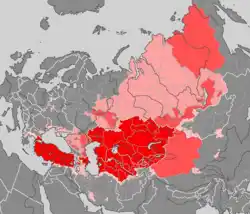Turkish emigration is the process whereby people of Turkish ethnicity have left Turkey and moved to other countries over the last century. Turkish emigration has been fuelled by many factors, the largest being economic opportunities available elsewhere. Overpopulation at home in Turkey, a country which has acted itself as a haven for large waves of political refugees from the Middle East in recent decades, has also driven Turkish emigration. Turkish people have migrated to a very large array of countries around Europe, in North America and to Australia. Often these countries have actively sought out Turkish migrant workers. This was the case with West Germany in particular, where gastarbeiter or ‘guest workers’ were encouraged to come to the country in an organized program between 1955 and 1973 to compensate for the number of young German men who had been killed during the Second World War. The scheme was adopted by the Netherlands and France in the 1960s. Today there are upwards of three million people of Turkish descent in Germany, while Turkish emigration has created a diaspora worldwide which is in the region of between seven and eight million people.[1]
Research your ancestors on MyHeritage
Turkish emigration chronology of eventsTurkish emigration chronology of events

Historically the Turkish people have been some of the world’s great migrants. After all, many Turkish people originated in the cold climes of Siberia in eastern Russia and along the northern extremes of the Asian Steppe, before they started migrating south and west in the fourth and fifth centuries CE, the era of the Great Migrations that transformed the ethnic and demographic landscape of Eurasia. Some Turkish groups ended up in China, some in Russia, some in Central Asia and some as far west as the Middle East and Asia Minor. They eventually settled in such large numbers in the latter region that it became known as Turkey, essentially meaning ‘the land of the Turks’. As such, there is a long tradition of Turkish migration stretching back more than a millennium and a half.[2]
The emergence and then colossal expansion of the Ottoman Empire to dominate Turkey, the Balkans, the Middle East and the Maghreb by the end of the sixteenth century facilitated a fresh round of Turkish emigration of a kind. Over the years hundreds of thousands of Turkish officials, merchants and others settled in the provinces of the empire, creating diaspora communities around the Eastern Mediterranean, though this would not have been considered ‘emigration’ in the modern sense, as these Turkish people were staying within the boundaries of the Turkish state as it stood at that time.[3] In any event, as the Ottoman Empire declined and lost territory in the nineteenth century and then collapsed after the First World War, millions of people of Turkish descent relocated to Turkey itself, often as part of agreed population transfers with countries like Greece via the Treaty of Lausanne.[4]

Modern Turkish emigration only really began on any sort of scale following the Second World War. Turkey had avoided becoming involved in the war and had a large young adult male population by the 1950s. This contrasted sharply with many European nations that had lost a substantial proportion of their young men in the fighting. Germany was particularly badly impacted in this regard and in 1955 West Germany (officially the Federal Republic of Germany) established a guest worker (gastarbeiter) program to bring in foreign workers to plug the large labor shortage in its economy. Turkey became one of the main sources of guest workers while the scheme ran for nearly two decades down to 1973. It was viewed as being successful enough that in the 1960s other countries, notably France and the Netherlands adopted it. The United Kingdom did not need to, as it had solved its post-war labor shortage by drawing on the colonial population from its vast empire, notably from the Caribbean colonies like Jamaica.[5]
Turkish emigration has continued down to the present day. Much of it has been driven by a quest for economic opportunity, as Turkey has remained a relatively poor nation with one foot in Europe. Tens of thousands of Turks began migrating to the United States at this time, a small number moved to Australi, while other still have spread out to virtually every country in Europe. A sign of how ubiquitous Turkish emigration has been over the last half a century is that there are few large cities in Europe today without a Turkish barber or kebab house, the twenty-first-century equivalent of the Irish bars and Italian restaurants that followed the Irish and Italians everywhere at the height of their migration waves. This is a two-way street though for Turkey. The country itself is host to the largest community of refugees in the world, with millions of Syrians, Iraqis and others seeking refuge having found temporary safety in Turkey over the last two decades during conflicts like the Syrian Civil War.[6]
Extent of Turkish emigrationExtent of Turkish emigration
The extent of Turkish emigration has been considerable. The foremost element of it was the movement of guest workers to West Germany between the mid-1950s and the mid-1970s. In all, it is believed that 2.7 million Turks applied for the right to go and work in Germany, of which applications three-quarters of a million were successful.[7] The numbers were less significant elsewhere. For instance, the 1960s saw over 10,000 Turks immigrating to the United States and thousands arrived to countries like France and the Netherlands. What is important though is that this emigration has continued decade after decade in a sustained way, creating substantial enough diaspora communities in many countries over time.[8]
Demographic impact of Turkish emigrationDemographic impact of Turkish emigration
The demographic impact of modern Turkish emigration has been immense. It has primarily been felt in Germany, especially the west of the country. Some three million people in Germany today were either born in Turkey or are second, third or even fourth generation Turkish Germans.[9] The Turkish American community is understood to be around a million strong, while some demographers argue for a similar number of people of Turkish descent living in France. Beyond these, between two and three million people of Turkish heritage live in a wide range of countries in Europe, the Americas and in Australia. Furthermore, the true scale of people with Turkish heritage worldwide is greater still, as many people who identify primarily as Greek, Macedonian, Bulgarian, or from one of numerous other Balkan or Eastern Mediterranean national groups, will have some Turkish heritage on account of the legacy of the Ottoman Empire and the mixing of different groups in south-eastern Europe over many centuries.[10]
See alsoSee also
Explore more about Turkish emigrationExplore more about Turkish emigration
- Germany, Telephone Directories records collection on MyHeritage
- Germany, Deaths and Burials, 1582-1958 records collection on MyHeritage
- Filae Family Trees records collection on MyHeritage
- France, Vital Records Index records collection on MyHeritage
- Netherlands, Civil Deaths, 1811-1965 records collection on MyHeritage
References
- ↑ https://www.dw.com/en/turkish-guest-workers-transformed-german-society/a-15489210
- ↑ https://thediplomat.com/2016/06/the-epic-story-of-how-the-turks-migrated-from-central-asia-to-turkey/
- ↑ https://www.worldhistory.org/Ottoman_Empire/
- ↑ https://www.middleeasteye.net/news/turkey-greece-population-exchange-painful-yearning-lost-past
- ↑ https://www.prm.ox.ac.uk/event/memoirs-in-my-suitcase
- ↑ https://www.migrationpolicy.org/article/turkey-migration-history
- ↑ https://www.dw.com/en/turkish-guest-workers-transformed-german-society/a-15489210
- ↑ Faiza Meberbeche Senouci, ‘The Turkish Diaspora in the United States: Immigration and Identity Formation’, in International Journal of Academic Research and Reflection, Vol. 4, No. 2 (2016),pp. 32–39.
- ↑ https://nationalpost.com/news/world/home-to-3-million-turkish-immigrants-germany-fears-rising-tensions-after-failed-coup
- ↑ https://feps-europe.eu/wp-content/uploads/downloads/publications/turkishdiaspora-report-final.pdf

